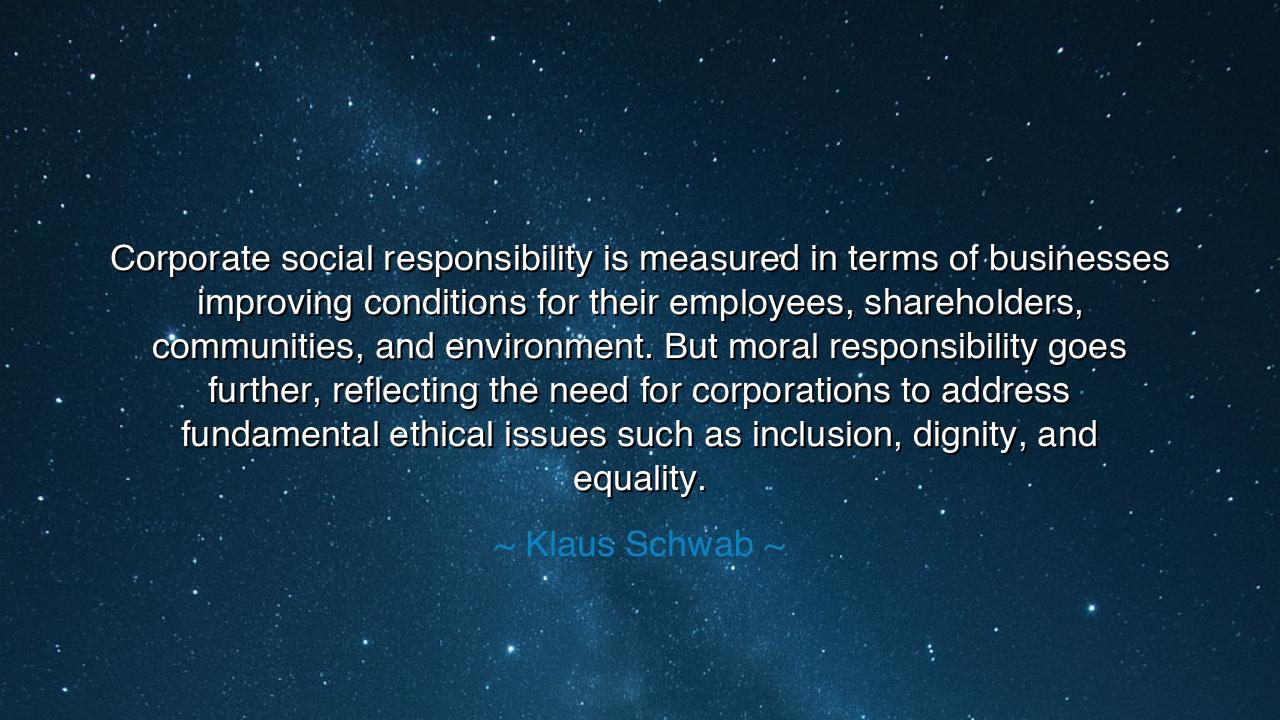
Corporate social responsibility is measured in terms of
Corporate social responsibility is measured in terms of businesses improving conditions for their employees, shareholders, communities, and environment. But moral responsibility goes further, reflecting the need for corporations to address fundamental ethical issues such as inclusion, dignity, and equality.






The words of Klaus Schwab — “Corporate social responsibility is measured in terms of businesses improving conditions for their employees, shareholders, communities, and environment. But moral responsibility goes further, reflecting the need for corporations to address fundamental ethical issues such as inclusion, dignity, and equality.” — stand like a torch held high in the age of commerce. They remind us that the pursuit of profit alone cannot define greatness, for wealth without virtue becomes decay, and progress without conscience becomes tyranny. In these words, Schwab, the founder of the World Economic Forum, speaks not only to the captains of industry but to all who wield influence over others. He calls forth a vision of moral responsibility, a deeper and nobler calling than that of mere success — a calling that binds the powerful to the eternal laws of justice, compassion, and human dignity.
Klaus Schwab, born in Germany amid the ruins and moral reckonings of the twentieth century, has spent his life pondering how industry and humanity might coexist in harmony. As the architect of the concept of stakeholder capitalism, he rejects the narrow vision that measures a company’s worth only by its profits. Instead, he teaches that corporations are living entities within a greater body — the community of mankind — and that their duty extends to all who share in their impact: employees, shareholders, the environment, and the wider society. This is the foundation of what he calls corporate social responsibility (CSR) — the idea that companies must give back to the world that sustains them. But in this quote, Schwab presses beyond even that noble principle. He speaks of a higher law — moral responsibility, the sacred duty not just to act well, but to be good.
The distinction he draws is profound. Corporate social responsibility is a matter of action; moral responsibility is a matter of conscience. The first can be measured in numbers — wages raised, forests replanted, schools built. The second cannot be quantified, for it concerns the invisible truths of the human heart: whether a company’s power is used with justice, whether its culture honors dignity, whether its leaders see their workers as instruments or as souls. Schwab reminds us that even the most generous deeds mean little if they are not born from respect for the inherent worth of every human being. Inclusion, equality, and dignity — these are not projects to be managed but virtues to be lived.
The ancients knew that power without morality breeds ruin. In the days of Rome, Marcus Aurelius, the philosopher-emperor, ruled not for conquest, but for the good of his people. He saw leadership as stewardship — a sacred trust from the divine. He wrote, “What is not good for the beehive cannot be good for the bee.” In this he echoed precisely the spirit of Schwab’s teaching: that no man or enterprise can thrive in a broken world, and that the welfare of the one is bound eternally to the welfare of the many. Like Aurelius, Schwab teaches that greatness is not measured by dominion, but by service — not by how much one takes, but by how much one uplifts.
Consider the story of Milton Hershey, the American chocolatier who, in the early twentieth century, built not only a factory but an entire town for his workers. He gave them homes, schools, parks, and fair wages — all at a time when exploitation was the law of industry. Hershey believed that a company could prosper only if its workers prospered too. His chocolate empire stood not merely as a monument of sweetness, but as a testament to the power of moral responsibility in business. Even decades after his death, the Hershey School he founded continues to educate orphaned and underprivileged children — proof that when commerce is guided by conscience, its legacy endures.
Klaus Schwab’s wisdom speaks powerfully to our own era, an age of vast corporations and trembling inequalities. Today, the world stands at a crossroads: one path leads to profit without principle, where technology and capital grow rich while humanity grows poor; the other leads to balance, where innovation serves life rather than dominating it. Schwab’s call to moral responsibility is the call to choose rightly — to remember that the purpose of business, as of all human endeavor, is not accumulation but advancement of the common good. Without inclusion, progress breeds resentment; without dignity, it breeds despair. But when equality and compassion guide industry, both wealth and wisdom flourish together.
And so, my children, let this be your lesson: whether you build companies, communities, or dreams, let morality be your compass. Do not measure success only in what you earn, but in what you heal. Treat your workers as partners, your environment as sacred ground, your competitors as fellow travelers on the road to betterment. Let your ambition be fierce, but let your heart be gentle. For it is written in the eternal order that power without justice is corruption, and that wealth without virtue is poverty of the soul.
Thus, the teaching of Klaus Schwab endures: corporate social responsibility is the duty of the hand, but moral responsibility is the duty of the heart. One changes the world’s surface; the other transforms its spirit. And if humanity is to survive the age of machines and markets, it will not be through the strength of its industries, but through the purity of its intentions — through the timeless truth that the highest profit of all is the good we do for one another.






AAdministratorAdministrator
Welcome, honored guests. Please leave a comment, we will respond soon